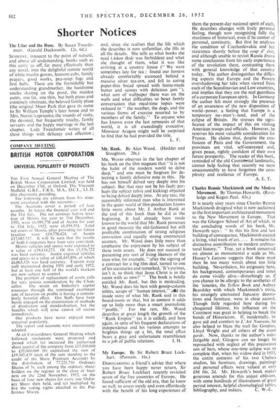Mr. Rank. By Alan Wood. (Hodder and Stoughton. 20s.) MR.
WOOD observes in the last chapter of his book on the film magnate that "it is not the habit of the modern world to delve deep," and one must be forgiven for de- tecting a faintly defensive note in this. He has not himself delved very deeply into his subject. But that may not be his fault: per- haps the subject (alive and kicking) objected to being delved deeply into. At any rate, the reasonably informed man who is interested in the queer world of film-production knows little more about Mr. J. Arthur Rank at the end of this book than he did at the beginning. It had already been made known to the world that Mr. Rank possesses in good measure the old-fashioned but still profitable combination of strong religious conviction and equally strong commercial acumen. Mr. Wood does little more than emphasise the enjoyment by his subject of these twin assets. He does not succeed in presenting any sort of living likeness of the man who, for example, "after the signing of a contract for a big film deal, turned to one of his secretaries and remarked, 'It's curious, isn't it, to think that Jesus Christ is in the room with us now?' " The book is boldly entitled Mr. Rank, but this is misleading. Mr. Wood does his best with gossip-column titbits, scraps of "human interest," afkl the inside story of what Mr. Rank said in this board-room or that, but in content it adds up to little more than a smart journalistic "profile." For the rest, Mr. Wood describes at great length the growth of the "Rank Empire" (as it is called), and here again, in spite of his frequent declarations of independence and his various attempts to brighten things up a bit, the total effect bears a grey and unfortunate resemblance to a job of public relations. I. H.


























 Previous page
Previous page